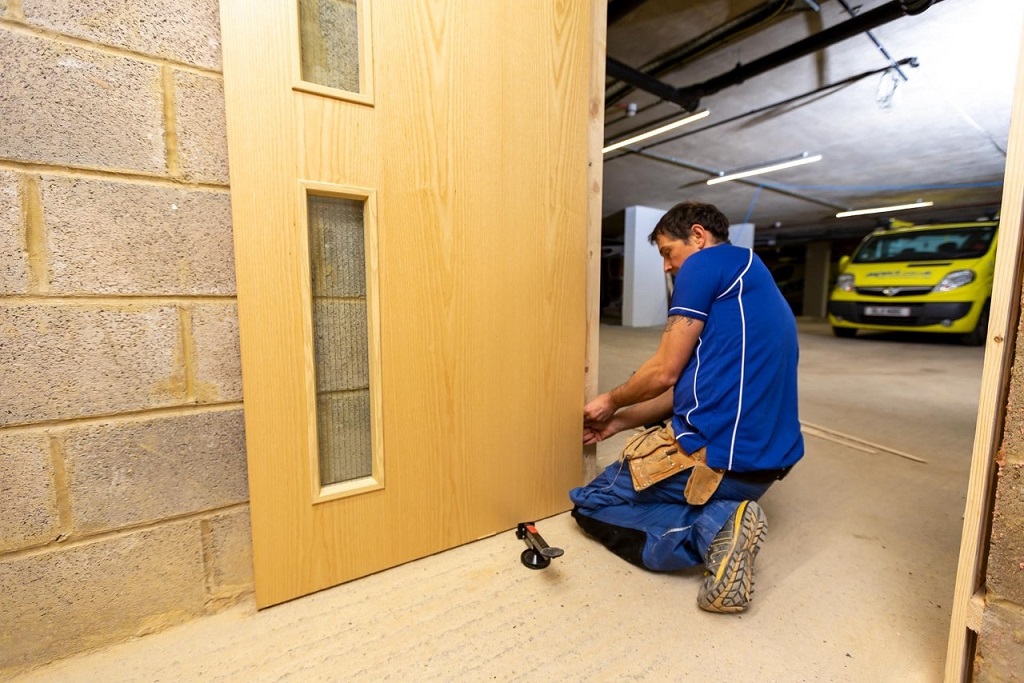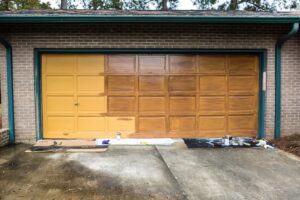
Your garage is more than just a parking spot; it often houses tools, flammable liquids, and other potential fire hazards. That’s why fire safety in your garage is crucial. One key element to consider is installing a fire door between your garage and the rest of your home.
This guide explores the pros and cons of installing a fire door, offering valuable insights to help you decide if it’s the right safety measure for your home.
Understanding Fire Doors: Their Role in Home Safety
Fire doors are specifically designed to withstand fire for a designated period, typically 30, 45, or 60 minutes. They are constructed with fire-resistant materials like steel or special composite materials and incorporate features like:
- Intumescent Seals: These seals swell when exposed to heat, creating a tighter barrier against smoke and flames.
- Solid Core: Unlike hollow core doors, fire doors have a solid core construction to impede fire spread.
- Self-Closing Hinges: These hinges ensure the door automatically closes in a fire, preventing flames and smoke from entering your living space.
The Case for Fire Doors: Benefits and Added Protection
There are several compelling reasons to consider installing a fire door between your garage and your home:
- Fire Containment: A prime benefit is the ability to slow the spread of fire. A fire door can buy valuable time for you and your family to evacuate safely.
- Smoke Barrier: Fire doors also act as barriers against smoke inhalation, a significant risk in fire emergencies.
- Increased Home Value: Some homeowners insurance companies may offer discounts for homes with fire doors installed between the garage and living space.
- Peace of Mind: Knowing you have an extra layer of protection can provide peace of mind and a sense of security.
Beyond Fire Safety: Additional Considerations
While fire safety is the primary concern, here are other factors to consider when deciding on a fire door:
- Soundproofing: Some fire doors offer enhanced soundproofing, reducing noise from your garage entering your living space.
- Security: While not their primary function, many fire doors are also equipped with security features like deadbolts for added protection against break-ins.
- Aesthetics: Fire doors come in various styles and finishes, allowing you to choose one that complements your home’s décor.
The Case Against Fire Doors: Potential Drawbacks
While fire doors offer undeniable advantages, there are also some potential drawbacks to consider:
- Cost: Fire doors can be more expensive than standard garage doors.
- Maintenance: Regularly inspect the door for proper operation and ensure the self-closing mechanism functions correctly.
- Weight: Fire doors are typically heavier than standard garage doors, potentially requiring a stronger door opener or support system.
Building Regulations and Your Local Fire Department
Building regulations regarding fire doors can vary depending on your location. Consulting your local fire department or building inspector is crucial to determine if a fire door is required in your garage.
Fire Prevention: Mitigating Risks Beyond Doors
Fire doors are an excellent safety measure, but they are not a replacement for fire prevention practices:
- Proper Storage: Store flammable liquids and chemicals in designated containers and away from heat sources.
- Electrical Maintenance: Ensure your garage’s electrical system is up-to-code and have it inspected regularly by a qualified electrician.
- Fire Extinguisher: Keep a properly rated fire extinguisher readily available in your garage.
- Regular Cleaning: Declutter your garage and remove any potential fire hazards like old paint rags or newspapers.

Beyond the Garage Door: Fire Safety Throughout Your Home
Fire safety extends beyond the garage door. Here are some additional recommendations:
- Smoke Detectors: Install smoke detectors in all sleeping areas and outside bedrooms on every level of your home.
- Escape Plan: Develop and practice a fire escape plan with your family. Include two escape routes from each room and a designated meeting place outside the home.
- Carbon Monoxide Detectors: Install carbon monoxide detectors in your home, especially near sleeping areas.
Related: How to Use Your Garage as a Garden Room
The Takeaway: Weighing Your Options – Fire Doors and Home Safety
The decision to install a fire door in your garage is a personal one. Weigh the fire risks in your garage, your budget, and your overall fire safety plan. Remember, a fire door offers valuable protection but should be viewed as one component of a comprehensive fire safety strategy in your home.
By implementing fire prevention measures, installing smoke detectors and carbon monoxide detectors, and practicing escape drills, you can significantly reduce your risk of fire and ensure the safety of yourself and your loved ones.







